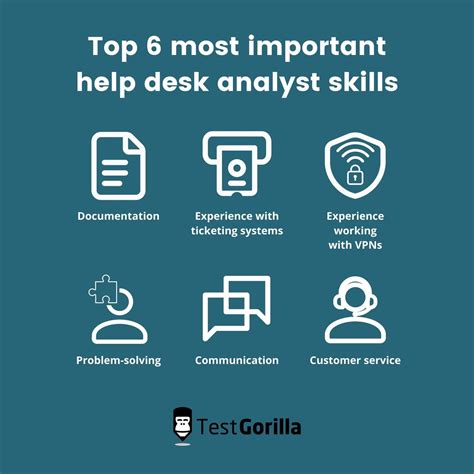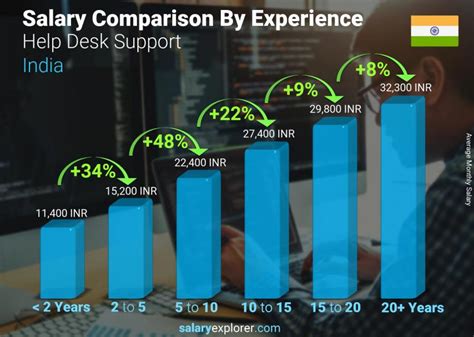The IT service desk is the nerve center of any modern organization, providing the crucial link between technology and the people who use it. For those with a passion for problem-solving and technology, a career on the service desk is not only a rewarding path but also a fantastic launchpad into the broader world of IT. But what can you expect to earn?
An IT service desk salary offers stable and competitive compensation, with a typical range in the United States falling between $45,000 for entry-level roles to over $80,000 for senior or specialized positions. This article will break down the numbers, explore the key factors that influence your earning potential, and provide a clear picture of what a career in IT support can offer.
What Does an IT Service Desk Analyst Do?

Often referred to as IT support specialists or help desk technicians, service desk analysts are the first line of defense for technological issues. They are the go-to experts for colleagues experiencing technical difficulties. Their primary role is to ensure that an organization's technology infrastructure runs smoothly for all users.
Key responsibilities typically include:
- Troubleshooting: Diagnosing and resolving hardware, software, and network issues for end-users.
- Ticket Management: Logging, prioritizing, and managing support requests using IT Service Management (ITSM) software.
- User Support: Providing technical assistance and guidance to users via phone, email, chat, or in person.
- System Maintenance: Assisting with equipment setup, user account creation, and software installation.
- Documentation: Creating and maintaining knowledge base articles to help users solve common problems independently.
Average IT Service Desk Salary

When analyzing compensation, it's important to look at data from multiple authoritative sources to get a complete picture.
According to the U.S. Bureau of Labor Statistics (BLS), the median annual wage for "Computer Support Specialists" was $60,930 in May 2023. This is a robust, data-backed figure that represents the national midpoint—half of the workers in the occupation earned more than that amount and half earned less.
Reputable salary aggregators provide a more granular view of the typical salary range:
- Salary.com reports that the average salary for a Help Desk Support professional in the U.S. typically falls between $52,000 and $65,000, depending on the tier of support.
- Payscale notes a similar range, with an average base salary around $56,000 per year. Their data shows the salary spectrum can stretch from approximately $41,000 for the bottom 10% to over $78,000 for the top 10% of earners.
- Glassdoor places the total pay average for a Service Desk Analyst at around $58,000 per year, which includes base salary and potential additional compensation like cash bonuses or profit sharing.
In summary, a reasonable expectation for an IT service desk salary in the United States is a range of $50,000 to $70,000, with your specific earnings determined by the factors below.
Key Factors That Influence Salary

Your salary isn't just a single number; it's a reflection of your skills, background, and the context of your employment. Here are the most significant factors that will impact your IT service desk salary.
### Level of Education & Certifications
While a four-year computer science degree is not always a strict requirement for entry-level roles, education and certifications play a huge role in boosting your earning potential.
- Education: An Associate's degree in a technology-related field is often sufficient to land a Tier 1 position. However, a Bachelor’s degree in Information Technology, Computer Science, or a related discipline can open doors to higher-paying jobs, particularly in larger corporations.
- Certifications: This is where you can truly differentiate yourself. Industry-recognized certifications validate your skills to employers. Key certifications that directly impact salary include:
- CompTIA A+: The industry standard for establishing a career in IT and a common requirement for service desk roles.
- CompTIA Network+: Demonstrates foundational networking skills, which can lead to higher-level support roles.
- ITIL® Foundation: The Information Technology Infrastructure Library (ITIL) is a framework for IT service management. A certification in ITIL is highly valued in enterprise environments and can lead to significant salary increases.
- Microsoft, Cisco, or Apple Certifications: Vendor-specific certifications prove expertise in widely used systems and can make you a more valuable candidate.
### Years of Experience
Experience is arguably the most critical factor in salary progression. The IT service desk operates on a tiered support model, and your compensation grows as you advance through these levels.
- Entry-Level (0-2 years): Often a Tier 1 analyst, handling common, straightforward issues. Expect a salary in the $45,000 to $55,000 range.
- Mid-Career (3-8 years): Progressing to a Tier 2 or Tier 3 role, you'll tackle more complex problems that require deeper knowledge. Salaries typically move into the $55,000 to $70,000 range.
- Senior/Lead (8+ years): In these roles, you may lead a team, manage complex projects, or serve as a subject matter expert. Senior service desk professionals and team leads can earn $70,000 to $85,000+.
### Geographic Location
Where you work matters. Salaries are often adjusted based on the local cost of living and the demand for tech talent in the area. Major metropolitan and tech hubs will offer significantly higher salaries than rural areas or cities with a lower cost of living.
For example, an IT service desk analyst in San Jose, CA, or New York, NY, might earn 20-30% more than the national average to compensate for high living expenses. In contrast, an analyst in a smaller midwestern city might earn closer to or slightly below the national average. Always research the specific salary benchmarks for your target city on sites like Glassdoor or Salary.com.
### Company Type
The size and industry of your employer have a direct impact on your paycheck.
- Large Tech Companies: Corporations like Google, Meta, or Microsoft pay top-dollar for all talent, including their internal support teams, often offering salaries and benefits well above the market average.
- Enterprise-Level Corporations (Finance, Healthcare): Large banks, hospitals, and Fortune 500 companies rely heavily on robust IT support and have the budget to pay competitive salaries.
- Managed Service Providers (MSPs): These companies provide outsourced IT services to other businesses. While the experience gained can be immense due to exposure to various client environments, salaries may be slightly below that of a large enterprise.
- Small to Medium-Sized Businesses (SMBs): SMBs typically have tighter budgets and may offer salaries on the lower end of the spectrum, but often provide excellent opportunities for hands-on learning across multiple IT domains.
- Government and Education: These sectors often provide excellent benefits and job security, though their base salaries may be slightly less competitive than in the private sector.
### Area of Specialization
The service desk is a gateway. By developing specialized skills, you can dramatically increase your value and earning potential, either within the service desk structure or by moving into a new IT role. Specializing in high-demand areas can command a premium salary.
Consider developing expertise in:
- Cybersecurity: Assisting with incident response and security tool management.
- Network Administration: Handling more advanced network troubleshooting.
- Cloud Computing: Supporting users on platforms like AWS, Azure, or Google Cloud.
- Enterprise Applications: Becoming the go-to expert for complex software like Salesforce, SAP, or Oracle.
Job Outlook

The future for IT support professionals is bright and stable. The BLS projects that employment for computer support specialists will grow by 5% from 2022 to 2032, which is faster than the average for all occupations.
This steady demand is driven by the fact that nearly every industry needs skilled professionals to support their technology and employees. As organizations continue to upgrade their computer equipment and software, the need for knowledgeable service desk analysts will remain constant.
Conclusion

A career on the IT service desk offers a reliable pathway into the technology industry with a competitive and growing salary. While a national average provides a good starting point, your personal earning potential is directly in your control.
To maximize your IT service desk salary, focus on these key takeaways:
1. Build a Strong Foundation: Earn foundational certifications like the CompTIA A+ to get your foot in the door.
2. Never Stop Learning: Pursue advanced certifications (Network+, ITIL) and specialize in high-demand areas like cloud or cybersecurity.
3. Gain Experience: Methodically advance from Tier 1 to higher-level roles to tackle more complex challenges and command a higher salary.
4. Know Your Worth: Research salary data for your specific location, industry, and experience level to ensure you are being compensated fairly.
The IT service desk is more than just a job—it's the beginning of a dynamic and rewarding career in technology. With the right strategy, you can build a successful future and a salary to match.
